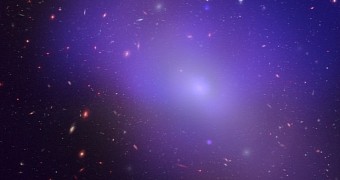Writing in the journal Monthly Notices of the Royal Astronomical Society, scientists with the Johns Hopkins University in Maryland, US, argue that massive black holes located at their core are the reason why aging galaxies eventually stop forming new stars.
Specifically, the researchers say that, according to evidence at hand, radio-frequency-emitting particles originating from black holes are to blame for the fact that, once they pass a certain age, galaxies enter some sort of cosmic menopause.
The formation of new stars in galaxies
In their paper, the Johns Hopkins University scientists behind this research project explain that, in order to form new stars, hot gas that gets drawn into a galaxy need first cool down by a considerable extent.
Thus, it is only after losing some heat that the gas can condense and collapse to birth stars. The more gas gets sucked into a galaxy, condenses, and collapses, the more stars the galaxy in question ends up packing.
In time, these star forming processes cause galaxies to become more massive and complex. The thing is that, at one point in their evolution, galaxies simply stop producing baby stars. Apparently, astronomers have long wondered why this happens.
“When you look into the past history of the universe, you see these galaxies building stars. At some point, they stop forming new stars and the question is: Why?” astronomer and study co-lead author Tobias Marriage told the press in an interview.
How black holes end star formation processes
Previous studies have shown that the hot gas that gets drawn in galaxies does not just enable the formation of new stars, but also feeds massive black holes at their core. This means that, while galaxies are busy birthing stars, egotistical black holes stay focused on expanding their waistline.
By the looks of it, galaxies whose black holes spew out radio-frequency-emitting particles at a speed similar to that of light are the same ones that no longer form baby stars, the Johns Hopkins University researchers write in the journal Monthly Notices of the Royal Astronomical Society.
Hence, the scientists argue that these particles probably keep the gas that is part and parcel of aging galaxies hot, essentially pulling the plug on star formation processes. As Tobias Marriage put it, “If gas is kept hot, it can’t collapse.”
The thing is that, for the time being at least, scientists can't quite explain how and why the particles keep the star-forming gas from cooling. “The exact mechanism behind this is not fully understood and there are still debates,” Tobias Marriage said. Hopefully, future investigations will solve this puzzle.

 14 DAY TRIAL //
14 DAY TRIAL //